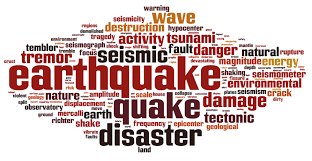The Earthquake in Italy 2016 – a very memorable lesson.
Alessandro and Luca – wolontariusze z Włoch przedstawili prezentację dotyczącą tragicznych wydarzeń w sierpniu 2016 roku kiedy to trzęsienie ziemi w regionach Umbria, Lacjum i Marche pochłonęło 239 istnień ludzkich oraz zniszczyło okoliczne miasteczka. Lektorzy wyjaśnili co powoduje trzęsienie ziemi, które rejony świata są najbardziej narażone tym kataklizmem oraz jak zachować się bezpiecznie w tak trudnej sytuacji.
Spotkanie odbyło się w języku angielskim dla grup realizujących innowację z języka angielskiego.
On 24 August 2016, a magnitude 6.2 earthquake hit the Apennines Mountains in central Italy, devastating the small towns of Amatrice, Accumoli and Pescara del Tronto, 293 lives were lost.
What causes Earthquakes?
Earthquakes happen when two large pieces of the Earth’s crust suddenly slip. This causes shock waves to shake the surface of the Earth in the form of an earthquake.
Where do earthquakes happen?
Earthquakes usually occur on the edges of large sections of the Earth’s crust called tectonic plates. These plates slowly move over a long period of time. Pressure slowly starts to build up where the edges are stuck and, once the pressure gets strong enough, the plates will suddenly move causing an earthquake.
How to measure the strength of Earthquakes?
To tell the strength of an earthquake scientists use a scale called the Moment Magnitude Scale or MMS (it used to be called the Richter scale). The larger the number on the MMS scale, the larger the earthquake.
4.0 – Could shake your house as if a large truck were passing close by.
6.0 – Stuff will fall off of shelves. Walls in some houses may crack and windows break.
7.0 – Weaker buildings will collapse and cracks will occur in bridges and on the street.
8.0 – Many buildings and bridges fall down. Large cracks in the earth.
9.0 and up – Whole cities flattened and large-scale damage.
(source:www.ducksters.com)
[Not a valid template]

